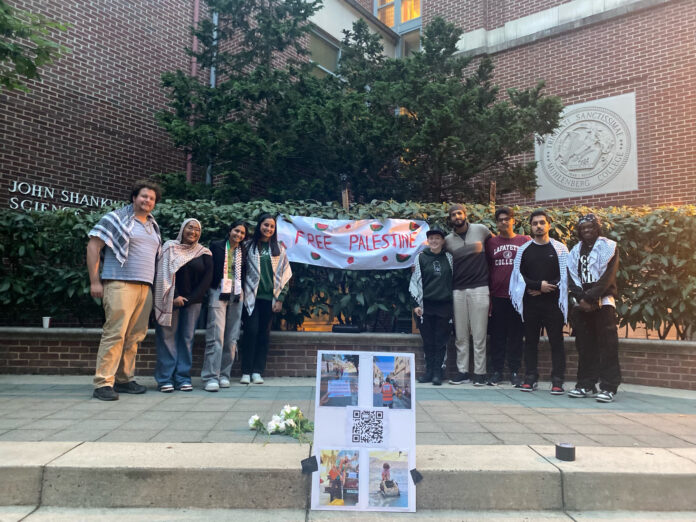
On Oct. 1, the Muslim Student Association (MSA), Middle Eastern Student Association (MESA) and Jewish Voices for Palestinian Liberation (JVPL) collaborated on a vigil for Palestine and the lives lost in Gaza, hosted in Parent’s Plaza. In a joint Instagram post between the three organizations, they described their mission of the vigil in the caption: “As the genocide in Gaza worsens, the West Bank and Lebanon are facing constant bombardment, threats of violence, and assault. We are holding this space to honor our martyrs, pray, and demand justice.”
Shajnin Howlander ‘27, one of the student organizers of the event, described their process and intentions behind the vigil. “The planning and organization—such as coordinating purchases and creating the speaking agenda—were handled by me, Milo (Obrzut ‘25), Sana (Nauman ‘25) and Babar (Khan ‘26). We specifically planned to hold the vigil before October 7 to reaffirm that the genocide and ethnic cleansing of Palestinians have been ongoing long before the recent resistance. This day of resistance is not the only time our people have fought against settler colonialism. For us, this vigil was a space to honor the martyrs of the genocide and to acknowledge Israel’s war on Gaza.”
The vigil began with a student speaker from Lafayette College, Yaseen Saleh, who spoke broadly about the conflict in the Middle East, grounding his beliefs in his Islamic faith. He referenced the Quran, and recited a daily prayer. He emphasized the importance of coming together as a community, independent of religious values. He ended his speech by stressing individual accountability and character. “We don’t want to earn the wrath of the one who was the most merciful, the most compassionate. We don’t want to say that we, we’re not those who are merciful or compassionate.”
Following Saleh, Obrzut opened with a translation of the Mourner’s Kaddish, ending with “May the harmony we experience as we gaze toward heaven be reflected in our harmony between all who dwell on the planet. Israelite, Ishmaelite, and all creatures upon this holy earth, and we say Amen.” He then spoke about JVPL and their larger mission statement and how “they [JVPL] needed a space to discuss [Israel-Palestine] openly without fear of our identity being weaponized against us.”
Howlander then spoke, sharing statistics on over 34,000 Palestinian deaths, according to the Gaza Health Ministry. She read the names of the first page of the 649 page report–all babies who had never turned one year old. She recited the names in Arabic, stating, “the least I can do is to learn their language.” Soon after, she gave out a piece of paper to every attendant, asking them to hold them up, facing away from them. Eventually, everyone was asked to turn the papers around. Each paper detailed a different Palestinian who has been killed in Gaza, giving information about them, and how they had been killed. Howlander ended her speech by detailing that these Palestinians “deserved a free Palestine, from the river to the sea.”
Nauman, president of MSA, spoke, reciting a poem from Palestinian writer, poet, professor and activist Refaat Alareer, who has been killed in Gaza. The poem is entitled “If I Must Die,” and ends with “If I must die / let it bring hope / let it be a tale.”
Next, faculty and staff members spoke, reciting poems and speaking on their personal thoughts and experiences. Richard Niesenbaum, Ph.D., first spoke and recited “No Genocide,” a poem by Sarah Scout which she dedicated to the Canadian Museum of Human Rights. Sharon Albert followed, also referencing the death toll published by the Gaza Health Ministry. She states, “if we think this started on October 7, we’re missing a lot of the story.” Albert then read a poem titled “[…],” by Palestinian American Fady Joudah. Jess Denke, outreach and assessment librarian, read a poem by Adrienne Brown titled “draft, ahmed.”
Following the faculty, there were six more student speeches. Ibrahim Sidibeh ‘25, spoke briefly about his Islamic faith, and recited an original poem titled “From Prison to Paradise: victory to the true believers.” Andre Rojas ‘25 then spoke, reading a poem by Marcellus Williams, who was recently executed after spending 24 years on death row. The poem is titled “The Perplexing Smiles of the Children of Palestine.”
Sabeen Safi ‘26, spoke next, opening with “A single death is a tragedy, but a million deaths is a statistic.” She discusses the scale of the loss in Palestine, and along with human reaction. “Think about this: Allentown’s population is about 125,000. Imagine if every single person in this city were wiped out, and then some. Entire communities, families, and generations gone. Yet, 186,000 feels distant, just another number. This is how dehumanization works, by overwhelming us with numbers. This way, we stop relating emotionally to individuals. We stop bearing witness to very real, very human loss behind each death. When we are shown statistics, the people become desensitized, and it becomes easier to turn a blind eye.”
She then shares the individual story of a six-year-old girl, Hind. Safi details the story of their forced evacuation order from their home. “About a quarter of a mile out, their vehicle came under fire, in what was supposed to be a safe passage for travelers… She [Hind] confirmed that now she was the only one alive in the car, surrounded by six dead bodies. Since Israeli troops were occupying Gaza City, permission was required to send an ambulance… As the paramedics finally got close, they turned on their lights and were on the line with their operators, when suddenly that line too went silent… Twelve days later, they found the burned ambulance… Inside the car, Hind’s body, along with the six other family members, [who] were tortured and dehumanized, with 355 bullets.”
Ariel, a recent Lafayette graduate, spoke next. They spoke about Israel in relation to the Western world. “Israel has gotten the green light and more and more billions of dollars in arms sales and aid, they’ve learned that they can continue to act with impunity, and invaded Lebanon starting last week…In addition to the Palestinian lives we’re honoring today with this beautiful vigil, I wanted to also recognize the over 1,000 Lebanese lives that have been lost.”
Howlander spoke again, reciting a poem from a Palestinian friend of hers about the Palestinian diaspora. She then shared a quote: “The oppressed see themselves in Falasteen, and colonizers see themselves in Israel.” She emphasizes: “Our voices matter, our collective pressure is making a difference. We know this because the backlash is actually getting really strong, and that happens throughout history when you know you’re on the right side.”
Khan, MSA’s Vice President, then shared a prayer.
Howlander spoke one final time, about giving back as a community. “The last part I really wanted to incorporate into this vigil is how do we give back? As a community here on campus, how do we give back? Not only do we have to give back through our actions and advocacy on campus, whether that’s starting rallies, protests, action movements, whether it’s joining other campuses in their fight against administration. We also need to give back in solidarity.” She then focused on the importance of raising money for Palestinians “in solidarity, not charity.”
Nauman reflected on a mission of the vigil. “We wanted to have this vigil to not only acknowledge and mourn these deaths, but also to educate the campus community about a culture and people that are being mercilessly eradicated. They are not just numbers or a statistic on a news site. These are people who were martyred and deserve to have their stories told. By reciting the stories of people like Refaat Alareer and Hind Rajab, we wanted to reflect an Islamic concept that martyrs never truly die.”
Safi gave her thoughts. “The vigil yesterday was a reminder of our shared humanity and the power of coming together in solidarity during times of very real loss. I am appreciative to see students, staff, faculty and administration in attendance, supporting one another.”
Denke reflected on the vigil, and the larger power of her community. “I deeply appreciate the ability to join with my community to mourn the loss of life in Palestine. When institutional responses are lacking, I’m continually impressed by our student’s ability to show up for one another and express compassion in light of great injustice. As an American, I do feel implicated in settler ideologies and militarism across the globe. My goal for my students is to develop their identities as global citizens with the power to critique systems of oppression and advocate for other people who experience dehumanization and stigma. I’m proud of the organizers of the vigil, especially Shajnin, for taking this stand.”
Ian Graybill ‘26 reflected on the event. “I thought it was really great to see such a wide range of students and organizations there. It felt especially powerful to have such a meaningful number of professors from different departments present, and especially in the wake of The Intercept’s article to have some of them coming up and speaking publicly after the steps the school has shown it’s willing to take, that was a strong show of solidarity. It felt like a step in the right direction that this many people were willing and able to come together publicly for this without the sort of resistance that vigils and protests experienced last year (and last semester especially), and I’m hopeful that between this event and what MESA, MSA, and JVPL put on during the rest of the semester the school makes some more serious considerations (and ultimately action) regarding the financial divestment and protection of academic freedom that we as a representative portion of the student body have been asking for.”
Amy Swartz ‘26 is an English & creative writing and political science double major. She is a General Editorial Assistant, and is thrilled to be a part of such an amazing organization! Outside of the Weekly, you can always find her reading a new book, updating her Spotify playlists, or rewatching an episode of New Girl!





















